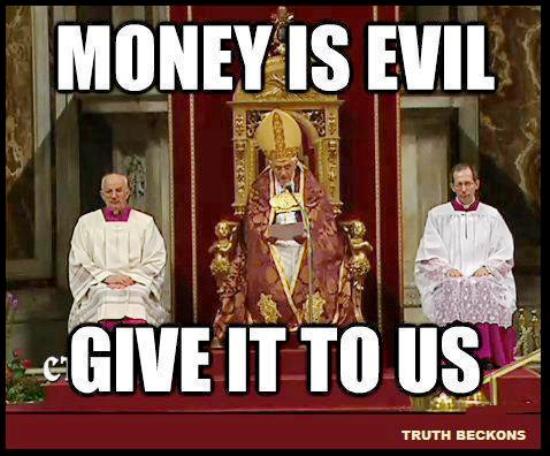When most people think of the requisites of Heaven, they think in terms of "good enough". People who meet or surpass a certain standard of good behavior get into heaven, people who don't go to Hell, or at least a long stay in Purgatory. Heaven, by the popular account, is life's Dean's List, a Who's Who of humanity's goody two-shoes, and requires us all to be, at least, "good enough". This is not true. Ladies and Gentlemen, you can never be "good enough" for heaven. No matter how heroic, compassionate, generous, or virtuous you are, you will never impress God, let alone impress him enough to gain a spot on the Heavenly roster. If Blessed Mother Teresa, in all of her radiating awesomeness, approached the Pearly Gates and said "Let me in, I've been a good girl my whole life!" St. Peter would cast her out. If Blessed John Paul II knocked on the Heavenly Doors and demanded access by merit of being an awesome Pope, which he was, He'd be left on the outside. Now, I hold in the highest faith that both Blessed Teresa and Blessed John Paul are denizens of the Beatific Vision, so don't mistake me. However, neither of them entered Heaven on the basis of being goody two-shoes.
Again, do not mistake me. I don't mean to say that we shouldn't strive to be good, nor am I excusing bad behavior. However, if you are hoping to get into heaven the same way you got into college, by meeting a certain standard of adequacy, you are sorely misguided my friend. You see, while humans are certainly diverse, we do share one simple thing in common: we are, each and every one of us, sinners. Sin is more than bad behavior, sin is bad reality. When Adam and Eve bit the apple, it was more than a no-no, it fractured the very reality we live in. "Good enough" is never good enough, nor does one get in heaven by being acceptable or adequate. Heaven is not for the well-behaved, the moral elite. It serves God no purpose to have a select posse, a Divine clique of the acceptable.
So what is the mark of the heavenly citizen, and why should we be good if not for heavenly admittance? Heaven, not merely being the reward of the moral all-stars, belongs to the beloved. God, in his supreme sovereignty and Divine Awesomeness, finds we simple human beings to be absolutely useless. God did not create us because he needed us or because we did something for him that he could not do for himself. God created us in love, by love, through love, to love, and to be loved. In Eden, it was not mankind's purpose to be adequate, because we were created perfectly. In Eden, we loved and were loved, and our Fall was when we chose to love our self rather then our Father. Heaven then, like Eden, is not moral economics, but Divine Romance.
Cue the Christ. Jesus Christ was without sin, not because he was fulfilling obligations, but because he fully and completely loved the Father. In his life, death, and Resurrection, Jesus Christ inundated the world in the loving bond of Father, Son, and Holy Spirit, an invitation for creation to join in participation of the Divine Relation. Christ gave us the ability to love God again, his Passion a stark testimony to God's unwavering love for us. In Christ, we're enabled and invited to approach God, as debtors come to pay, but as sons and daughters embracing their loving Father.
Christianity is, at its purest, not a moral how-to, but a romance with the Divine, and from that romance flows moral excellence. As a lover only desires to do good for their beloved, so do Christians desire only goodness for God. Christians strive to do good, not because we hope to earn something, but because we love. Love is the perfection merit can never be, the most sublime expression of our being. Heaven is for those who, at the core of their being, are caught up in the relationship of Divine Love. This is Heavenly: life lived in love, not obligation; a life not of achievement but of charity. The souls in Heaven are there, not because they paid their price, but because they made themselves familiar with Heaven's loving reality long ago.
C.S. Lewis once said "When you arrive in Heaven, it will look like it was made for you, because you were made for it." In all our desires, in our life of pursuits both successful and failed, we truly crave only one thing: Eden Reborn, the most sublime life of loving and being loved. If, as I suspected, Heaven has fallen out of fashion, its because people have separated heaven from the notion of Love and, like all things, have connected it to the notion achievement, merit, and competition. Ladies and Gentlemen, you cannot compete your way into Heaven. The Pearly Gates do not open to the winner, but to the Lover. What is most Heavenly, what is the highest good, is not the greatest moral achievement, but the greatest act of Love. Love, and you will be saved. Love, and Heaven will be yours.

